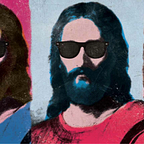The “Typical” Indian
Stereotypes of South Asians
After writing about Apu and Manjula’s wedding on my latest post, I really came to think about the stereotypical images portrayed within the show, The Simpsons. This blog post will be dedicated to drawing attention to the stereotypes associated with the Indian race and just how much popular culture makes use of these stereotypes.
If you don’t already know him, Apu Nahasapeemapetilon, the owner of Springfield’s convenience store, Kwik-E-Mart, represents the “typical” Indian immigrant who also depicts many stereotypes associated with South Asians.
It is often argued that the portrayal of Apu within The Simpsons is a racist caricature. Mallika Rao, a reporter for the Huffington Post, clearly supports this argument as she claims, “an image of Apu flashes on a nearby screen: chest hair visible, palms pressed in greeting, a vacant, silly grin on his face” (Rao, 2013).
Let me start off by discussing his last name. Why was the name, Nahasapeemapetilon, used as Apu’s surname? Could the writer of The Simpsons not think of any other Indian name that is shorter in length? Was it used to create humor? Or was it simply chosen because it is a common stereotype that all Indian people have very long names that are hard to pronounce?
Lets move on though… Apu was considered an illegal immigrant up until he passed his citizenship test. The image of all Indians being illegal immigrants is common within mainstream media today. Nevertheless, Apu also holds a PhD in computer science. Personally, I believe that Apu’s academic credentials, as a computer science PhD holder, is stereotypical as well. I say this because most Asian people are commonly viewed as intelligent. In addition, most South Indian people are depicted as intelligent within fields of technology. The reason I believe Apu’s academic image represents stereotypical views is because of the irony associated with his character. The fact that he holds a PhD in computer science is completely affiliated with stereotypes of the Indian race because if he was truly a smart individual, then why is it that The Simpsons also portrays him with traits of backwardness and stupidity? For instance, Apu is often viewed as a character that is unable to adapt to the customary traits of Springfield. The Simpsons portrays his character as one that represents a departure from the “norm”. This is clearly evident as he often jumps from behind the cashier counter of his convenience store and shouts threats to his customers. He is a perfect representation as someone that is “backward” and needs to be civilized. This is a good example of the use of orientalism within mass media, and how stereotypes are often used to prove the point that members of the East are simply an archetype of a non-west culture (Harris, Week 4 Lecture).
As much as I laughed as I watched the clip of The Simpsons above, there is no doubt that I find it stereotypical. When Apu states, “if only that mark on your forehead was an off button”, he is referring to an extremely religious symbol that identifies an individual as a Hindu. When audiences view a man, that is clearly of South Indian descent, call something that is so sacred “a mark on your forehead”, it can cause them to believe that there is absolutely no meaning associated with that symbol. They may then reaffirm that it is merely just a mark/dot on one’s forehead. Therefore, The Simpsons uses Apu himself to endorse stereotypes associated with the Hindu religion.
Likewise, an extremely short, eight second clip of The Simpsons is able to expose a huge stereotype connected with the Indian society. This clip reaffirms the idea that the only food that Indian people eat is curry.
Dr. Cabbie, a 2014 Canadian film, is a perfect example of a movie that exposes nearly all of the stereotypes associated with people of the Indian race. These representations of Indian people definitely produce a good laugh, however, they can also hide thought since they represent such flatness and similarity. This was argued by Stuart Hall, a cultural theorist who studied the representation of culture and religion. He also argued that representations in media are all about power, and they can create stereotypes (Harris, Week 4 Lecture). This is clearly evident through Apu’s character within The Simpsons, Dr. Cabbie, and many other films and television series.
Dr. Jonathan Z. Smith argues that television shows the differences between people and cultures (Smith, 1999). However, the stereotypes that arise from this can cause damage when individuals are not aware of what they are being exposed to. This is further explained with the article, Is It Time to Retire Apu?. Utkarsh Ambudkar, a Baltimore native born to South Indian parents, claims how much he hates Apu and his character. He states that the stereotypes portrayed from Apu’s character caused him to experience bullying as a young child (Rao, 2013). Therefore, education is crucial because it helps people make judgments about what they see on TV.
Sources:
Harris, Jennifer, A. “Representations of Muslims and Islam in Popular Culture.” RLG233H1F Lecture. University of Toronto, Toronto, ON. 29 September 2014. Lecture.
Rao, Mallika. “Is It Time To Retire Apu?” The Huffington Post. 20 September 2013. Online.
Smith, Jonathan Z. and Benney, Alfred. Created by Alfred Benney. “Dr. Jonathan Z. Smith Engages with the Question: How Has Television Influenced the Study of Religion?” November 1999. DigitalCommons@Fairfield. Web.http://digitalcommons.fairfield.edu/asrvideos/184
